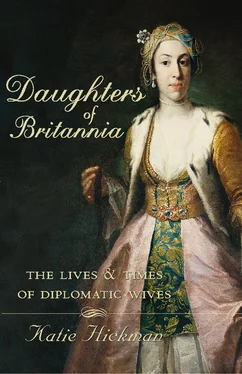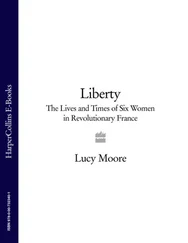After these captured Britons had been identified and set free, it was to Mrs Blanckley that the care of these unfortunates most frequently fell. Sometimes they were English sailors, or a handful of travellers on board a foreign passenger ship which had fallen into the hands of Algerian pirates. Sometimes they were the crew of an English merchant vessel captured on the high seas with its cargo of cotton, opium or oil. If the captain of one of these ships (who was often accompanied by his wife and family) was not properly insured his capture would spell certain ruin. At least he would have been allowed to keep a change of clothing; the rest of the crew on board such vessels were routinely stripped of everything they possessed, right down to their underclothes. Mrs Blanckley grew adept at making up not only extra beds, but also new shirts with which to clothe her destitute countrymen.
On one occasion fifteen Englishmen were shipwrecked on the Barbary Coast, at a place called Gigery. The Blanckleys first received knowledge of their capture when a small piece of bluish-white paper was delivered to their house, much creased and soiled, on which a few scarcely legible lines had been scratched with charcoal and water. It told a distressing but all too familiar tale. The ship belonging to these English mariners, laden with a cargo of pigs of lead and barrels of gunpowder, had been on its way to one of the Mediterranean ports, when a storm had driven it onto the rocks. The ‘inhospitable savages’ who inhabited this remote piece of coast had overpowered the exhausted men and diverted them of everything, including all their clothes. Freezing with cold and half-starved, the fifteen men watched helplessly from the shore as, in their haste take possession of the ship’s cargo, several of their captors tied pigs of lead to their waists, instantly sinking to their deaths as they attempted to swim back to shore. Another group later blew themselves up when they built a fire too close to one of the barrels of gunpowder. Perhaps anxious to be rid of these unlucky Christian devils, they were now demanding a large ransom.
It was only with difficulty that the outraged Mr Blanckley could be made ‘to comprehend the truth of the Dey’s reply, which was, that he had not the least command or influence with the men of Gigery … that they had ever continued a wild and completely savage people; and that had any Algerine subjects fallen into their hands, he, the Dey, would equally have been obliged to pay a ransom for their liberation.’ The compassionate Blanckleys paid the ransom from their own pocket, and a few days later the thirteen mariners – ‘two having sunk under their misery’ – arrived in Algiers.
The men had scarcely a rag upon them, but Mrs Blanckley was well prepared and already had beds and clothing waiting for them. She tended their wounds and fed them, although her greatest anxiety over the following weeks was that ‘they might be injured by taking too great a quantity of food, after their long state of almost starvation; and she used great caution in having nourishment distributed to them.’ ‘In this, and in every other instance,’ Elizabeth wrote, ‘did my excellent parents act a part worthy of the good Samaritan; their house, their purse, and even their wardrobe, being opened and freely bestowed according to the wants of their unfortunate fellow-creatures.’ 1
In no other profession has a wife been so intimately involved with her husband’s work. While not everyone had the extraordinary task of sewing shirts for starving shipwreck survivors, it was a partnership which, in one form or another, had been taking shape from the very earliest days of diplomacy.
The Earl of Stair, ambassador to Paris in 1715, was noted for keeping ‘the most splendid house in Paris next to that of the King, and having with him his Countess and her daughter, both ladies of the greatest honour and politeness’. Here the ambassador would entertain the principal lords and ladies of France ‘with all possible elegance’, but after about ten o’clock at night his custom was to ‘pretend business, and leave the company to the care of his lady, withdraw to his Room, undress himself, and repair to the coffee-houses incognito; and, by a dexterous Method of Conversation, find out the secrets of the Day’. 2 In the 1730s Mrs Vigor, whose husband was consul-general in St Petersburg, liked to do her embroidery at the Countess of Biron’s, where the Tsar was a constant visitor. This was in no way for her own amusement, she claimed, but for the advantage these contacts might bring her husband ‘in the station he is in’. 3
Marriage to a diplomat was a commitment not just to an individual but to an entire way of life. ‘CONSIDER SMALL MEANS AND FOREIGN LIFE,’ Lady Fane, herself the child of diplomats, telegraphed frantically to her own daughter when she announced her engagement to a young Foreign Service subaltern. 4 The vagaries of diplomatic life, its insecurities and discomforts as well as its privileges, meant that husbands often demanded far more of their wives than most women might legitimately expect.
The twenty-one-year-old Catherine Borland might have thought twice if she had had someone like Lady Fane to advise her when in 1898 she became engaged to George Macartney, the first and perhaps most famous British consul to Kashgar. Assuming that her fiancé was still safely en poste , Catherine was in her kitchen in Edinburgh, innocently baking a cake one Saturday morning, when the maid announced that George had arrived. Although they had been engaged for nearly two years, to her astonishment he calmly announced that they must be married within the week, ‘for he had only got three months’ leave from Kashgar, and already five weeks of it had gone’. Just one week later they set off on their ‘great adventure’. ‘To me it was a great adventure indeed,’ Catherine later recalled, ‘for I was the most timid, unenterprising girl in the world. I had hardly been beyond the limits of my own sheltered home, and big family of brothers and sisters, had never had any desire whatever to see the world, and certainly had no qualifications for a pioneer’s life, beyond being able to make a cake.’
In the seventeen years that Catherine Macartney spent in Chinese Turkistan she had to master a far greater range of accomplishments. Fortunately, she seems to have been one of those women who was quite simply born to the pioneering life, and learnt to adapt both to a new husband and to a new life with extraordinary speed.
A journey of that sort is a pretty good test to one’s temper [she wrote of her first arduous six-week journey to Kashgar] for one’s nerves get strained, at times almost to breaking point. Everything seems to go wrong when one is utterly tired out, and sometimes very hungry. If two people can go through the test of such a journey without quarrelling seriously, they can get through under any circumstances. We just survived it, and it promised well for the long journey through life. 5
There were others, however, who were not so lucky; others from whom, however devoted they may have been as wives, diplomatic life required sacrifices they found terribly hard to bear. ‘You cannot imagine how sorry I am at giving up our snug country Darby and Joan life for all the plagues and tinsel of diplomacy,’ wrote Anne Disbrowe in a letter from St Petersburg, where her husband was posted in the 1820s. The glitter of Alexander I’s court was a far cry from the braying donkeys and dust storms of Kashgar, but for Anne it was just as hard: ‘I once thought I was ambitious, but either I was mistaken in the conjecture or the quality is worn out, and perhaps having attained my wishes I want nothing more.’ 6 Having been told that they would only be gone a month or so, she had left her two little girls behind in England. In the event it was three years before she finally returned to England and was able to see her daughters again.
Читать дальше












